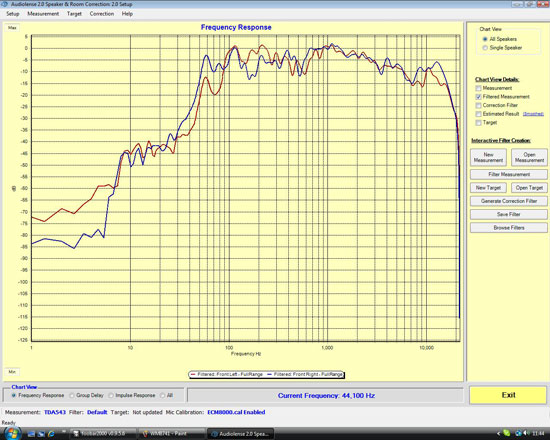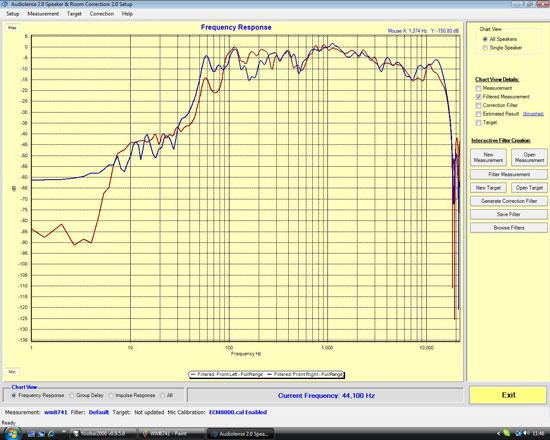Subjective Listening - Arrrgh!
For audio playback, we use Foobar 2000 alongside Windows Media Player. All music is transferred first to the hard drive in WAV format using Exact Audio Copy at a 4x read speed. Before we continue with subjective listening impressions, let's take a look at the measured room response of both DACs and listen to a couple of tracks without any DRC engaged.
The lowish output voltage of the passive I/V configured TDA1543 means we have to attempt to balance volume as best we can with the 2V output of the tube/transformer output of the Opus DAC for comparison purposes. After some adjustment and re-attempted measurements, we get a close enough match to see how the room responds to the Opus. Microphone gain and placement was kept at exactly the same point throughout the course of taking measurements. Each measurement was taken a number of times to see if any drastic changes could be observed.
Doede DAC Red=Left speaker, Blue=Right. Due to furniture placement, there is a 10dB offset between the channels at around 162Hz. |
The response is of the Transparence speakers with the TDA1543 is pretty much as expected, rolling off sharply under 60Hz and over 13.5k.
Opus |
Unsurprisingly, there's little to divide the two room sweep responses. The question is how both DACs sound when compared subjectively, both with and without DRC.
Listening tests are conducted using tracks from Maxwell's Urban Hang Suite and Embrya albums. Both albums feature music containing deep articulate bass lines, with vocals and instruments that should stress every part of the Bicone Signature frequency response.
Firing up "Til The Cops Come Knocking" on the Doede DAC first, the thing that strikes me is its directness. Soundstage height and depth can be best described as compact with a focused central image. This creates the perception of the vocalist sitting a couple of feet in front of the speakers. Instruments also have a "hang in the air" factor, without any real overemphasis on the finer details or decay of sounds. If "in your face" reproduction of micro details is important to you, you'll find you'll have to concentrate on hearing them with this unit in the loop. Everything's there, but you don't get buckets of spatial information that enhances micro-detail presence. Maybe that's the way it's supposed to be?
Rendition of high frequency sounds such as cymbals is on the smooth side compared to what I can recall from the Legato DACs of the Pioneer. I guess this may be a trait of non-oversampling. Overall, I'm quite impressed by the sound, considering the uncomplicated approach of Doede's implementation of the TDA1543. Subjectively, the sound has a very neutral character yet still manages to present itself without a fatiguing nature.
Now it's time to check out how the Opus fares in comparison. Both DACs are connected to the preamp simultaneously so that I can switch over quickly between the two while memory is still fresh. I spin up the same tracks from Maxwell and I'm amazed to find the perceived difference in presentation is far more apparent than I'd expected. The vocal forwardness of the TDA1543 is gone; the same vocal rendition sits further back between the speakers but has gained the impression of extending past the height of the baffles, and background instruments seem to have shifted back by a good few feet. The compact soundstage impression that the TDA1543 gave has been replaced with something far more expansive and spatial and the focus is now on all the elements of the recording. The finer details are readily apparent with the Opus; everything is projected in its own space and draws your attention. Mid-bass does not sound as prominent as it did on the TDA1543, the notes seem to be a little leaner and perhaps more analytical. Vocals and cymbals are especially alluring, something that we can put down to the sonic traits of the 3A5s on the output of the WM8741 DACs. To confirm the perceived differences I keep switching back and forth between the two units, each time amazed that the change is so apparent.










114 Comments
View All Comments
mindless1 - Monday, December 1, 2008 - link
The fact is, even audio streams that measure the same can and do still sound different. The problem is the resolution of measurement and the misconceived notion that the brain interprets sound at a fixed interval as measured.There's a lot of snake oil in the audiophile world, but there's also a lot of what you'd like to call "magic" only be cause you don't accept it as non-magic.
Any decent DAC would in idealized theory be as good, but in practice a different IC topology may lend itself better to certain inherant localized noise frequencies and cutoffs, be better mated to the circuit it's dropped into, have drifts from thermal changes, etc. If they were all the same why would there be so many? I will agree that which modern DAC is used in a reasonably good design matters less than what follows after it in the chain but the best way to minimize any potential for degradation is to start out with what is most likely to minimize it in every way possible then following this concept the entire time, waiting and seeing if the end result is audibly different rather than downplaying them all without knowing the additive result yet.
CSMR - Monday, December 1, 2008 - link
Yes if you are maximizing quality you will choose the best of all components. But it's more sensible to care about cost and time too, so you have to prioritize. The value of the research about the unimportance of DACs (at at beyond a certain level) is that you can stop worrying about this part of the chain and spend you time/money where it is important.JonnyDough - Tuesday, December 2, 2008 - link
Exactly my point. Why spend more on one component if it's going to be "bottlenecked" by another one. Spending $2000 on a nice amp is crazy if your other components are crap. I think in the end it's like all other techs. You want decent stuff for a reasonable price unless you have more money than brains. While I scoff at people willing to spend more than few thousand on a sound system, without them we wouldn't have gotten to where we are today - with good possibilities on the market. As long as you like what you hear, who cares if it's perfect? At one point is something "good enough?" I mean honestly, there are people starving in the world, friends dying of cancer, etc...and we want to worry about whether or not something is inaudibly "perfect." Blow your money on something that MATTERS, you can't listen to music every hour of everyday unless your job is singing.CSMR - Tuesday, December 2, 2008 - link
I meant you can spend time/money on speakers/room acoustics/dsp but food for starving people is admittedly a better use of time and money.JonnyDough - Wednesday, December 3, 2008 - link
That's actually a matter of perspective. For example, you can donate food to a starving kid in some third world country and next thing you know that child has three kids and no way to feed them - and you've just marginally made the problem worse, not better.I think money is better spent on education, which leads to fewer babies. Many countries do not have quality farmland that can support the population on their own (the U.S. supports a large percentage of the world's population). Then there's natural habitat destruction, pollution from oil for having to ship food to them, etc. You get the picture.
JonnyDough - Monday, December 1, 2008 - link
While I was generally agreeing with CMSR above, I guess what everyone ends up saying is that hearing is subjective, which is something audiophiles are always agreeing upon yet they still love to argue over things.Does a vinyl record produce better sound than a CD?
It depends on what an individual values most.
A CD may produce less static noise, but have a "duller" sound, seemingly less highs and lows. It all depends on what one appreciates with their own ears.
While there are measurements that can be taken in a closed chamber, one sound system might actually sound better in a specific home or room than another for whatever reason. Even so, the average person can rarely tell a difference these days between the moderately priced components.
The really silly thing is that people will spend $200 on a sound card and then use cheap plastic speakers.
Rajinder Gill - Monday, December 1, 2008 - link
Lol, it's ok, everyone in entitled to have their say.It's the first piece so bear with us while we try to cater to a wider set of ideals.
With regards to the obj/subj stuff, it's an argument that'll never be solved.
later
CSMR - Monday, December 1, 2008 - link
Sorry if I came on too strongly; I was just expecting that Anandtech would have not necessarily an expert take but at least a more technical take than you get in audiophile communities.I would do some more fundamental thinking about what are the key factors in computer audio playback.
As a start you could rank in terms of what is most critical:
computer performance, computer quietness, software (drivers, dsp), analog line out, volume control, amplification, cables, speakers, room acoustics.
I won't give you my list but you should think about it and it is possible to compare many of these things in a very quantitative way, and some are more important than others by several orders of magnitude.
AnnihilatorX - Monday, December 1, 2008 - link
A dumb question about correction.The theory behind it is simple enough, but why do we need dedicated hardware to do the correction? Why can't we use simple graphical equalizers? I understand graphical equalizers are quite discrete in the range of selectable frequencies. How much difference does it make?
Rajinder Gill - Monday, December 1, 2008 - link
DRC - ease of use and range of control, plus taking care of things in the digital realm rather than in the analogue.You could fudge some control with a multi band digital equaliser and the means to measure the response, but it'd be damn tedious and utimately limited.